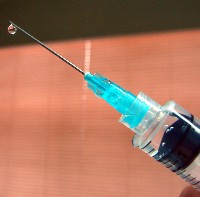 The National Institute of Allergy and Infectious Diseases (NIAID), part of National Institutes of Health in Bethesda, Maryland, reports that an experimental vaccine to prevent genital herpes disease in women, proved ineffective when tested in a recently concluded clinical trial.
The National Institute of Allergy and Infectious Diseases (NIAID), part of National Institutes of Health in Bethesda, Maryland, reports that an experimental vaccine to prevent genital herpes disease in women, proved ineffective when tested in a recently concluded clinical trial.
GlaxoSmithKline (GSK) Biologicals, based in Belgium, developed the vaccine it calls Simplirix. GSK announced today it would not pursue further development of the vaccine.
The Phase 3 trial, known as the Herpevac Trial for Women and sponsored by GSK, with support from NIAID, began in 2002. Some 8,323 women aged 18-30 years participated in the trial at 50 sites in the United States and Canada. NIAID says at the time of their enrollment, the study participants were free of the two types of herpes simplex viruses (HSV), HSV-1 and HSV-2.
One Herpevac trial group received the candidate vaccine, containing HSV protein along with an agent designed to boost immune responses. The second, control group received a version of Havrix, a licensed vaccine against hepatitis A. Thus, all participants had the potential opportunity to be protected against either genital herpes or hepatitis A. GSK also manufactures Havrix.
Each volunteer was vaccinated at the beginning of the study and again one and six months later. The participants were followed for 20 months after the initial injection and evaluated at each visit for HSV infection and genital herpes disease.
The results showed that the investigational vaccine was ineffective in protecting against genital herpes disease. The estimate of vaccine effectiveness was 20 percent, but all estimates have statistical uncertainty, and this effect was not substantially different from zero.
These results contrasted with two earlier clinical studies involving smaller numbers of men and women who did not have genital herpes but whose sexual partners were known to be infected. In those trials the candidate vaccine prevented genital herpes disease in more than 70 percent of the female volunteers who were free of HSV-1 and HSV-2, but had no clear effect in men. These studies formed the basis to conduct the larger Herpevac study in women only.
NIAID does not know at this time why the vaccine proved ineffective, but the study collaborators continue to evaluate the trial data and intend to provide a more detailed analysis at a later date.
Photo: ZaldyImg/Flickr

 RSS - Posts
RSS - Posts
You must be logged in to post a comment.